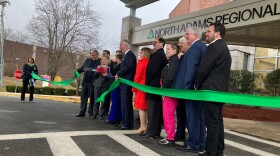The North Adams Regional Hospital, which is owned by Berkshire Health Systems, received a federal designation on Wednesday that is key to its long-term financial stability. It has been waiting for it since the facility reopened in March.
BHS President and CEO Darlene Rodowicz said there have been "a lot of high-fives" since the facility got word this week that the Centers for Medicare and Medicaid Services (CMS) designated it a "Critical Access Hospital."
The designation pays for staffing regardless of the number of patients. Rodowicz said it is critical in rural areas.
"We shouldn't have to go without necessary services because of where we happen to live," she said. "I mean I can't create more volume in a small community... but we still have the same need for emergency services. We still have the same need for surgeries, the same need for imaging."
The designation is retroactive to July 12, 2024. There were no job cuts while the hospital waited for the federal designation. Berkshire Health Systems provided cash flow since March to cover costs.
"Now we'll start working with Medicare and Medicaid to see what we can get, on a retroactive basis, between March and July," Rodowicz said.
The first North Adams Regional Hospital closed abruptly in March 2014 and then declared bankruptcy.
Congressman Richard Neal, who helped get the criteria changed so that NARH could be eligible for the "critical access" status, said in a statement, “This designation works to resolve stark inequities in rural and underserved communities as it relates to our nation’s health system."
The hospital has staff for twelve in-patient beds, but is licensed for eighteen. Rodowicz said the hospital will hire more "as demand grows."
Another advantage to being a critical access hospital is that "swing" beds are covered by Medicare. A patient who has been admitted as an inpatient for acute care, such as surgery, can stay to recover rather than move to a separate facility for short term rehabilitation. Medicare will cover the patient as the type of care shifts.
"Having the "swing" availability in Berkshire County, and northern Berkshire in particular, will allow patients to have a little bit longer time to really embrace the recovery and be able to succeed when they make it home," Rodowicz said.
Even before getting the designation, the hospital has seen a 10 to 15% increase in the number of new patients.
"We have patients that have shown up," she said, "that have been living in our community, that have not used any health care services at all for ten years," she said.





